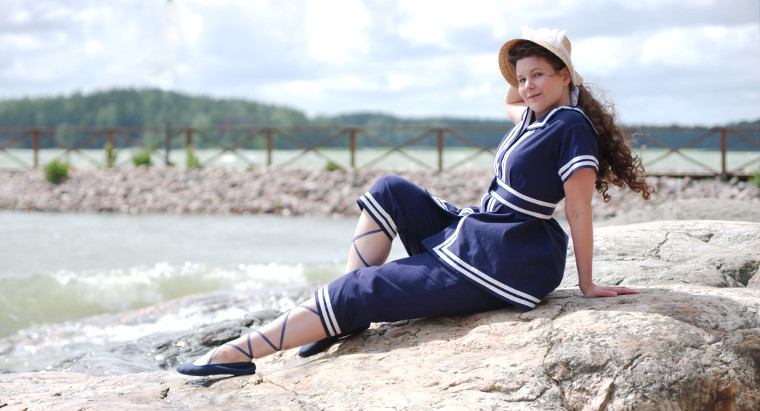
Victorian
bathing suit, 2019
This
is a story about the sometimes surprising consequences of
weakened impulse control.
I can't quite remember when and where the idea of a victorian bathing suit entered my brain, but I'm fairly certain that cinematic entertaintment is to blame. Next I remembered that my trusted "Fashions Of The Gilded Age"-book has among other marvellous things a few patterns for bathing suits. The third, fatal step was that I thought I might very possibly have some odd piece of flannel in my stash.
I took a better look at the patterns for curiosity, and the "Embroidered Bathing Suit" (page 145) from Harper's Bazaar 1882 appealed to me in its simplicity. I googled some more fashion illustrations and extant examples, and somehow managed to convince myself that making one would be just the quick and relaxing protect I needed after recently finishing the Tissot inspired day dress with all that kilting and accesorizing.
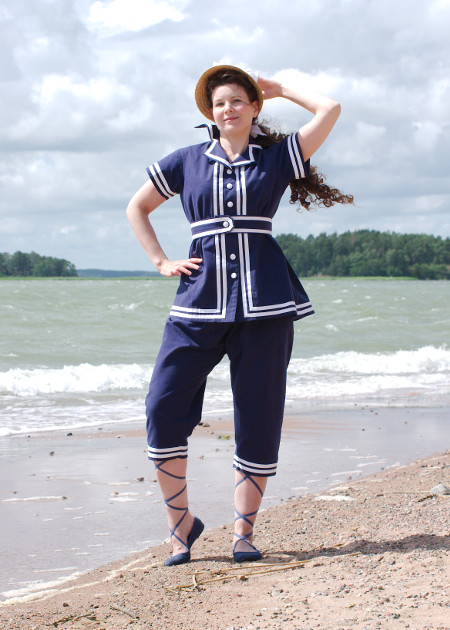
Did I really need a victorian bathing suit, or more accurately would I ever have an occasion to wear one? Well, there was none planned as yet, but then again this quick little thing would not take so much time and money. If I used stash materials it could even be a sensible choice.
I did eventually manage to excavate the flannel, a pretty baby blue, but I was a shorter length than I had imagined. I had already planned to combine some white flannel to make it do, but there was even less of that. I still thought I might just get something out of it, but luckily I had the good sense to take it into shower with me to see how it would look wet. The nice, lightweight, very soft flannel became a bit too transparent, so I abandoned the idea of using it on the spot.
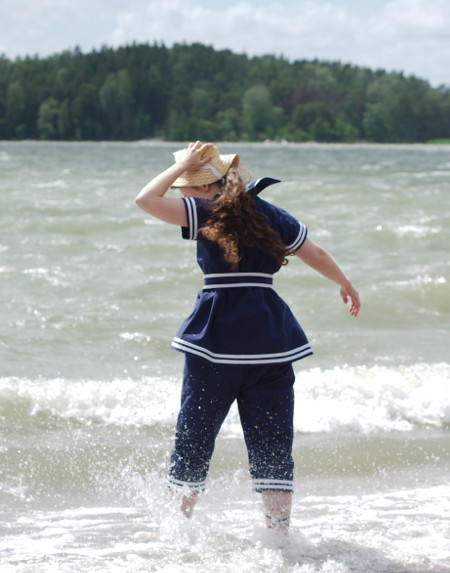
This little drawback sort of took away my excuse of using stash material. On the other hand I had found out in my quick internet search that baby blue was not at all a typical color choice for a bathing suit, and actually I had already began to fancy a dark blue one with snappy white stripes. So, at this point I was so absorbed in the planning and had even began playing with the pattern that I gave up and bought more fabric.
I found a reasonably priced navy blue cotton flannel and ordered it without a sample, reasoning that flannel is flannel and the navy tone wouldn't have to match anything. It turned out to be heavier than I thought and quite stiff, though it did soften a little bit when washed. Well, as I had bought it I would use it.
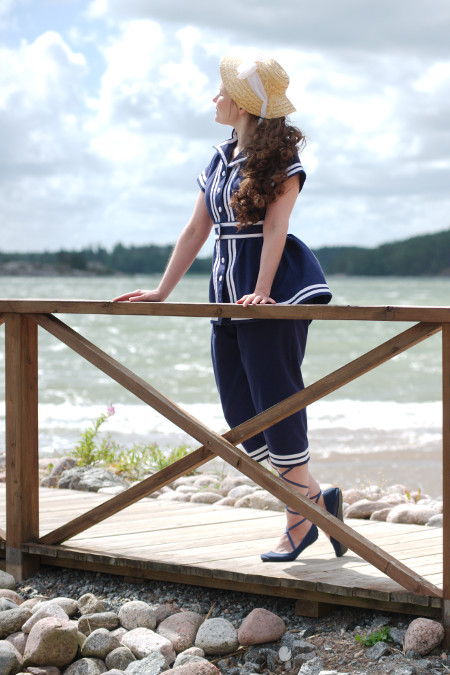
By the way, I'm well aware that wool flannel would have been an ideal and more period appropriate choice, but it would be much harder to find in a quality that would not tickle me and also exceed my budget.
The rather classic white tape trimming was inspired by several period images and museum pieces. I like the cheerful and chic navy and white combo in my modern wardrobe too.
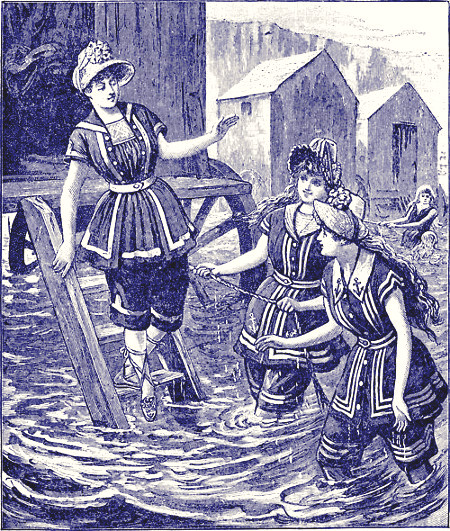
I especially liked this illustration, dating from a few years later but showing bathing suits in a very similar style. While the embroidery in the original model is lovely, it would be way too much work for a garment that wouldn't get much use. Simple tape borders would be rather quick to make instead. I also loved the ridiculously impractical free flowing curls and the pretty sun hats.
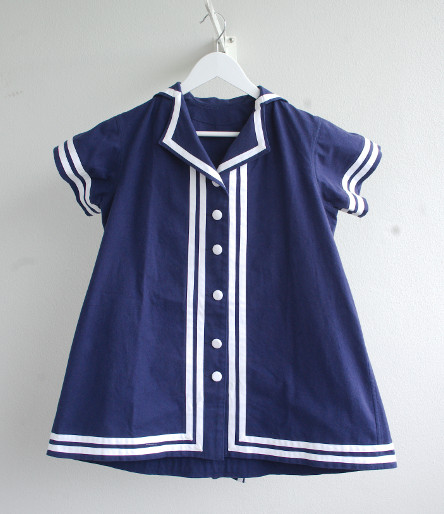
The pattern drafting was fairly straightforward. The simple blouse pattern was close to my size to begin with, I just drafted it a bit smaller in width. I added some length when cutting the mock up, as I have a long torso and I'm more likely to be taller than shorter compared to the average victorian lady. The sleeve and collar I copied as straight from the book.
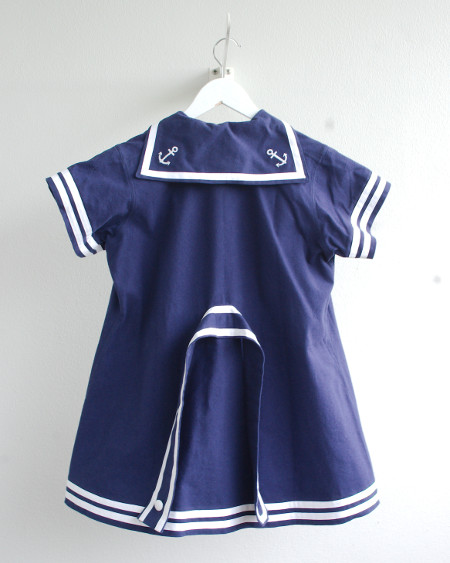
I had to make some adjustments in the fitting. The shoulder was way too sloped for me, and I found out that the sleeve looked less heavy when I narrowed it a bit at the lower end.
The collar fit weirdly and did not look anything like in the illustration, but on the other hand it looked similar enough to other collars I had seen on period illustrations so I decided to keep it as it was.
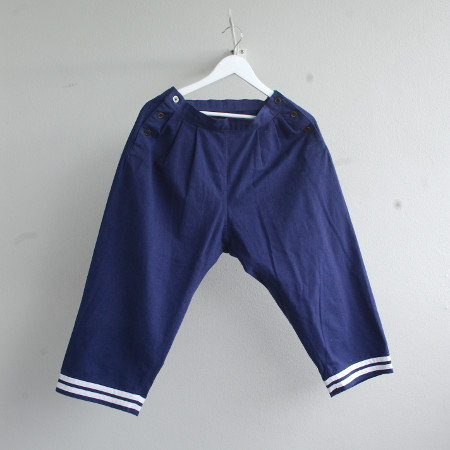
On the trousers I kept the width of the pattern piece as it was, but lengthened the legs following the same logic as with the blouse. I also drafted the waist higher at the back and lower at the front, something I have to do with most modern trouser patterns too. I also narrowed the legs at the bottom to get them to look less clunky.
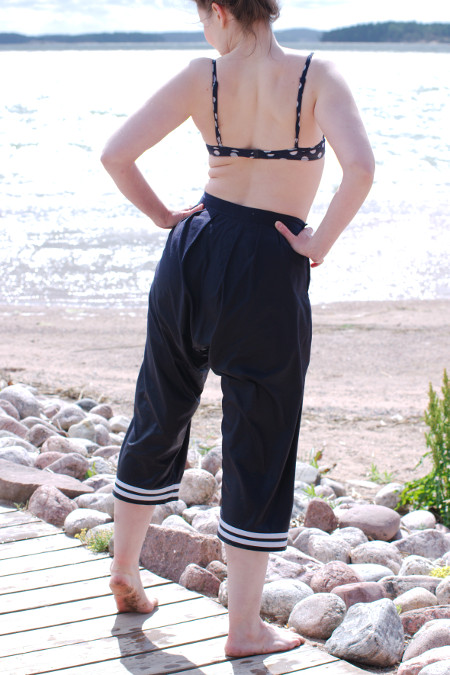
I left the trousers rather loose and baggy, especially at the back. They don't look terribly flattering to a modern eye, but I like swimming so I wanted to be able to actually swim in this. For the same reason I placed the belt in the blouse above my natural waist, at the level of my lowest ribs, so it wouldn't dig into my waist. I must have been a funny sight when I tried to make swimming moves on dry land in my mock up pants made from old sheets.
I had planned to adjust the original pattern only to fit my size, but with a few other tweaks I ended up flaring and lengthening the blouse still a bit more, especially at the back. Like mentioned above, the pants don't look very hot so the more they are covered the better, and besides most bathing suit tops seem to have been considerably longer than this rather risque pattern.
After lengthening both the blouse and the trousers I realized that there was no way I could have managed to cut it from the baby blue flannel anyway. Happily I had ordered a generous length of the navy one.
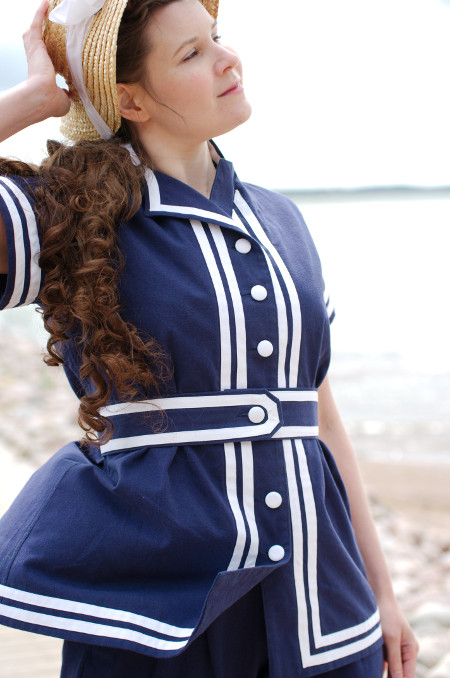
Thanks to the mock up I didn't have to waste time on much further fitting but could just concentrate on the sewing. I did try on the trousers though and checked the waist pleats before sewing on the waistband, as I had marked them rather haphazardly on the mock up.
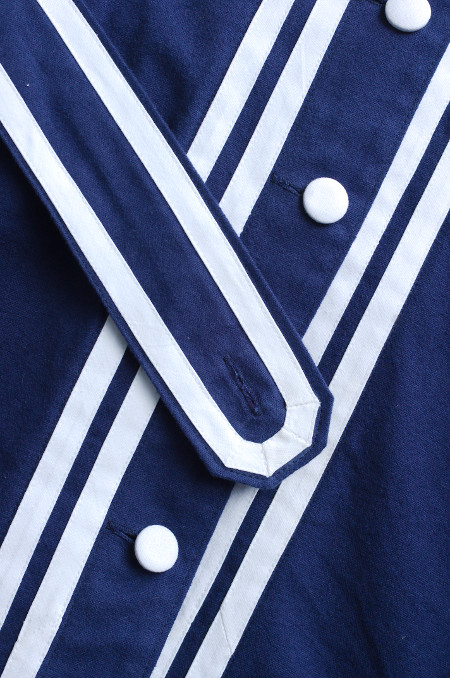
I had some self made cotton bias tape left over from binding stays. It was cut from a vintage bedsheet and thus much more tightly woven than the ready made one, so the dark base wouldn't show through. I still had some of the same (or similar enough) sheet, so I cut some more. Home made bias tape is never quite even in width and the joins can be a bit clunky, but I was not going to be too fastidious with this.
Well, okay, I did not put the bathsuit together the absolutely fastest way possible either, as I just couldn't resist hiding the white tape stitching on the inside with wide hems and facings wherever possible. I stitched the hems and facings with a dark thread right next to the tapes so they would show as little as possible.
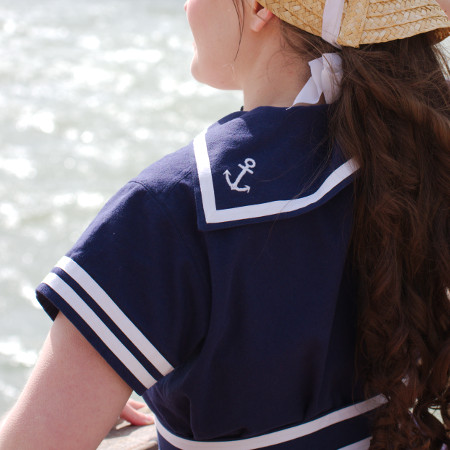
I also succumbed to adding a tiny bit of embroidery in the shape of little anchor designs on the collar corners. It was a cute detail and quite quick to make. I did contemplate adding embroidered anchors on the blouse front corners too, but decided I rather liked the simple trimming as it was.
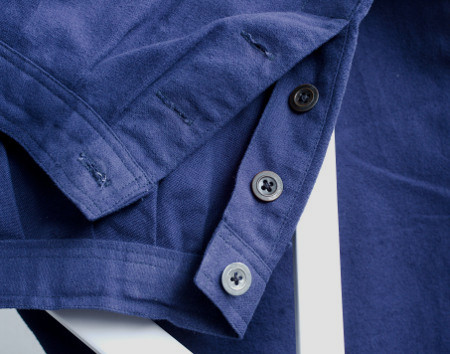
The buttonholes on the trousers would be covered by the blouse hem, so I made them by machine and furnished the openings with a motley collection of metal buttons. I had originally thought I might make the more visible blouse buttonholes by hand, as I actually enjoy making buttonholes, but then came to my senses and realized that the time that would take would be better spent elsewhere. In the dark material the machine made buttonholes are not so conspicuous after all, especially flanked by the eye-catching white stripes. The blouse buttons got a matching white cotton covering.
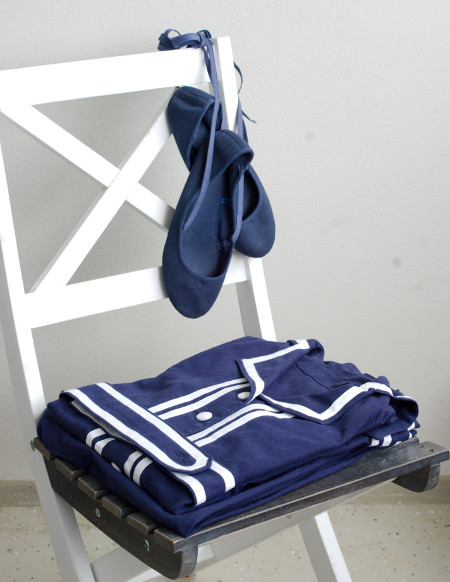
The straw hat was originally the first draft, so to speak, for my tissot dress - not only did I change my mind about the style I wanted, but I also made this one in a hurry and by machine, and it doesn'ẗ look terribly great up close. I added a bit of taffeta ribbon and decided it would do for this. A bathing cap would have been more practical, of course, but a hat looks so much nicer.
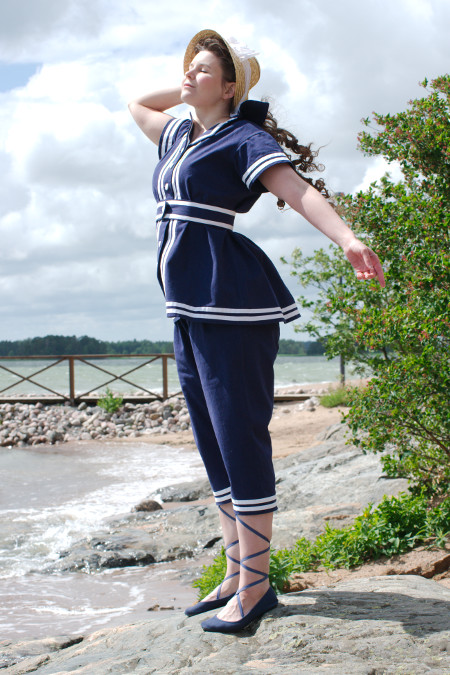
Like I mentioned before, the fabric was heavier than I had thought, and I was a bit worried at the beginning that it would not drape as nicely as the muslin mock up - the fit was quite loose and might look baggy. I think it worked quite nice in the end, after all, and at least it's not too clingy.
In this era one should wear some undergarments under a bathing suit, possibly even a swimming corset. I decided to consciously ignore this, at least for now, as this was to be more of a quick and fun than totally accurate project. I wore just a modern bikini underneath to get some bust shaping, and besides this way I could remove the heavy soaked flannel suit whenever I wanted without offending public decency.
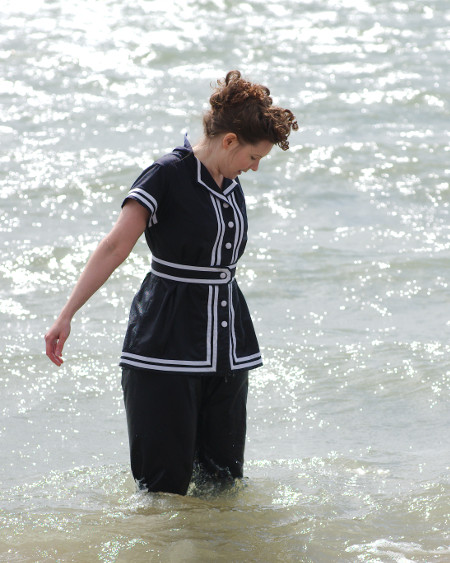
The bathing suit proved sturdy and comfortable in use, both for climbing on the rocks and taking a quick swim. As expected the wet cotton flannel was heavy and really chilly on a windy day, and took forever to dry, but on the other hand it did not become too unseemingly clingy.
The slippers on the other hand were a terrible idea - as soon as I got into the water they were filled with sand with the first wave. And sand in your shoes does a lot more damage than walking barefoot in the sand. Maybe their slippers fit more snug back then or maybe they were a nuisance endured because bare toes would be scandalous, I really don't know. I'm only wearing them on dry land.
So, in the end I did manage to spend some hours pattern drafting and a few evenings after the work sewing this, and I'm sure I could have used that time making something I'll have more use of, but heck, it's cute! And there has been some talk of arranging a Victorian beach party, next summer maybe.
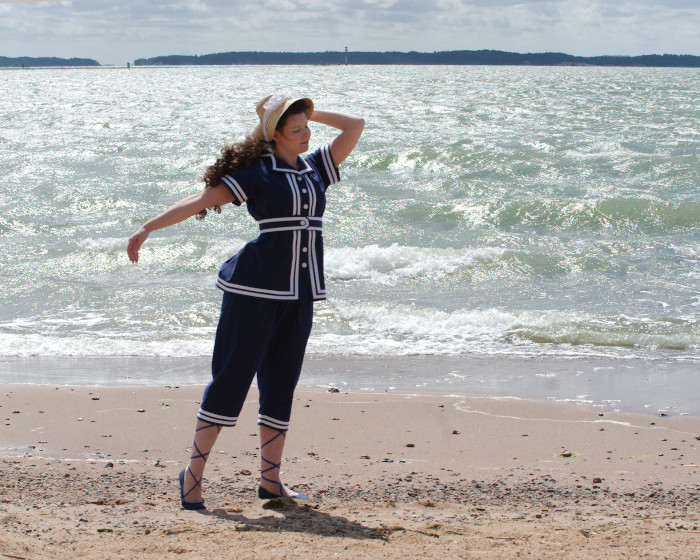
I can't quite remember when and where the idea of a victorian bathing suit entered my brain, but I'm fairly certain that cinematic entertaintment is to blame. Next I remembered that my trusted "Fashions Of The Gilded Age"-book has among other marvellous things a few patterns for bathing suits. The third, fatal step was that I thought I might very possibly have some odd piece of flannel in my stash.
I took a better look at the patterns for curiosity, and the "Embroidered Bathing Suit" (page 145) from Harper's Bazaar 1882 appealed to me in its simplicity. I googled some more fashion illustrations and extant examples, and somehow managed to convince myself that making one would be just the quick and relaxing protect I needed after recently finishing the Tissot inspired day dress with all that kilting and accesorizing.

Did I really need a victorian bathing suit, or more accurately would I ever have an occasion to wear one? Well, there was none planned as yet, but then again this quick little thing would not take so much time and money. If I used stash materials it could even be a sensible choice.
I did eventually manage to excavate the flannel, a pretty baby blue, but I was a shorter length than I had imagined. I had already planned to combine some white flannel to make it do, but there was even less of that. I still thought I might just get something out of it, but luckily I had the good sense to take it into shower with me to see how it would look wet. The nice, lightweight, very soft flannel became a bit too transparent, so I abandoned the idea of using it on the spot.

This little drawback sort of took away my excuse of using stash material. On the other hand I had found out in my quick internet search that baby blue was not at all a typical color choice for a bathing suit, and actually I had already began to fancy a dark blue one with snappy white stripes. So, at this point I was so absorbed in the planning and had even began playing with the pattern that I gave up and bought more fabric.
I found a reasonably priced navy blue cotton flannel and ordered it without a sample, reasoning that flannel is flannel and the navy tone wouldn't have to match anything. It turned out to be heavier than I thought and quite stiff, though it did soften a little bit when washed. Well, as I had bought it I would use it.

By the way, I'm well aware that wool flannel would have been an ideal and more period appropriate choice, but it would be much harder to find in a quality that would not tickle me and also exceed my budget.
The rather classic white tape trimming was inspired by several period images and museum pieces. I like the cheerful and chic navy and white combo in my modern wardrobe too.

I especially liked this illustration, dating from a few years later but showing bathing suits in a very similar style. While the embroidery in the original model is lovely, it would be way too much work for a garment that wouldn't get much use. Simple tape borders would be rather quick to make instead. I also loved the ridiculously impractical free flowing curls and the pretty sun hats.

The
pattern
The pattern drafting was fairly straightforward. The simple blouse pattern was close to my size to begin with, I just drafted it a bit smaller in width. I added some length when cutting the mock up, as I have a long torso and I'm more likely to be taller than shorter compared to the average victorian lady. The sleeve and collar I copied as straight from the book.

I had to make some adjustments in the fitting. The shoulder was way too sloped for me, and I found out that the sleeve looked less heavy when I narrowed it a bit at the lower end.
The collar fit weirdly and did not look anything like in the illustration, but on the other hand it looked similar enough to other collars I had seen on period illustrations so I decided to keep it as it was.

On the trousers I kept the width of the pattern piece as it was, but lengthened the legs following the same logic as with the blouse. I also drafted the waist higher at the back and lower at the front, something I have to do with most modern trouser patterns too. I also narrowed the legs at the bottom to get them to look less clunky.

I left the trousers rather loose and baggy, especially at the back. They don't look terribly flattering to a modern eye, but I like swimming so I wanted to be able to actually swim in this. For the same reason I placed the belt in the blouse above my natural waist, at the level of my lowest ribs, so it wouldn't dig into my waist. I must have been a funny sight when I tried to make swimming moves on dry land in my mock up pants made from old sheets.
I had planned to adjust the original pattern only to fit my size, but with a few other tweaks I ended up flaring and lengthening the blouse still a bit more, especially at the back. Like mentioned above, the pants don't look very hot so the more they are covered the better, and besides most bathing suit tops seem to have been considerably longer than this rather risque pattern.
After lengthening both the blouse and the trousers I realized that there was no way I could have managed to cut it from the baby blue flannel anyway. Happily I had ordered a generous length of the navy one.

Sewing
the suit
The sewing was fairly straigthforward. I
had decided to keep this an easy therapy project, so I
didn't even begin to dig into proper period construction. I
put the garments together with flat felled seams and
finished the front edges and the collar seam with facing.
The pants got sturdy buttoned openings at the sides.Thanks to the mock up I didn't have to waste time on much further fitting but could just concentrate on the sewing. I did try on the trousers though and checked the waist pleats before sewing on the waistband, as I had marked them rather haphazardly on the mock up.

I had some self made cotton bias tape left over from binding stays. It was cut from a vintage bedsheet and thus much more tightly woven than the ready made one, so the dark base wouldn't show through. I still had some of the same (or similar enough) sheet, so I cut some more. Home made bias tape is never quite even in width and the joins can be a bit clunky, but I was not going to be too fastidious with this.
Well, okay, I did not put the bathsuit together the absolutely fastest way possible either, as I just couldn't resist hiding the white tape stitching on the inside with wide hems and facings wherever possible. I stitched the hems and facings with a dark thread right next to the tapes so they would show as little as possible.

I also succumbed to adding a tiny bit of embroidery in the shape of little anchor designs on the collar corners. It was a cute detail and quite quick to make. I did contemplate adding embroidered anchors on the blouse front corners too, but decided I rather liked the simple trimming as it was.

The buttonholes on the trousers would be covered by the blouse hem, so I made them by machine and furnished the openings with a motley collection of metal buttons. I had originally thought I might make the more visible blouse buttonholes by hand, as I actually enjoy making buttonholes, but then came to my senses and realized that the time that would take would be better spent elsewhere. In the dark material the machine made buttonholes are not so conspicuous after all, especially flanked by the eye-catching white stripes. The blouse buttons got a matching white cotton covering.

Accessorising
Victorian ladies finished their bathing
attire with dainty bathing slippers to protect their dainty
white feet from rocks and shells, or maybe for decency's
sake, I don't know. I actually got inspired to rip apart a
pair of espadrillos and got quite far in making new uppers
from the remains of the flannel, but then decided they
looked too clunky and bought second hand ballerinas instead.
They even matched the bath suit color pretty well, and all I
had to do was to add the tapes.The straw hat was originally the first draft, so to speak, for my tissot dress - not only did I change my mind about the style I wanted, but I also made this one in a hurry and by machine, and it doesn'ẗ look terribly great up close. I added a bit of taffeta ribbon and decided it would do for this. A bathing cap would have been more practical, of course, but a hat looks so much nicer.

Like I mentioned before, the fabric was heavier than I had thought, and I was a bit worried at the beginning that it would not drape as nicely as the muslin mock up - the fit was quite loose and might look baggy. I think it worked quite nice in the end, after all, and at least it's not too clingy.
In this era one should wear some undergarments under a bathing suit, possibly even a swimming corset. I decided to consciously ignore this, at least for now, as this was to be more of a quick and fun than totally accurate project. I wore just a modern bikini underneath to get some bust shaping, and besides this way I could remove the heavy soaked flannel suit whenever I wanted without offending public decency.

The bathing suit proved sturdy and comfortable in use, both for climbing on the rocks and taking a quick swim. As expected the wet cotton flannel was heavy and really chilly on a windy day, and took forever to dry, but on the other hand it did not become too unseemingly clingy.
The slippers on the other hand were a terrible idea - as soon as I got into the water they were filled with sand with the first wave. And sand in your shoes does a lot more damage than walking barefoot in the sand. Maybe their slippers fit more snug back then or maybe they were a nuisance endured because bare toes would be scandalous, I really don't know. I'm only wearing them on dry land.
So, in the end I did manage to spend some hours pattern drafting and a few evenings after the work sewing this, and I'm sure I could have used that time making something I'll have more use of, but heck, it's cute! And there has been some talk of arranging a Victorian beach party, next summer maybe.
